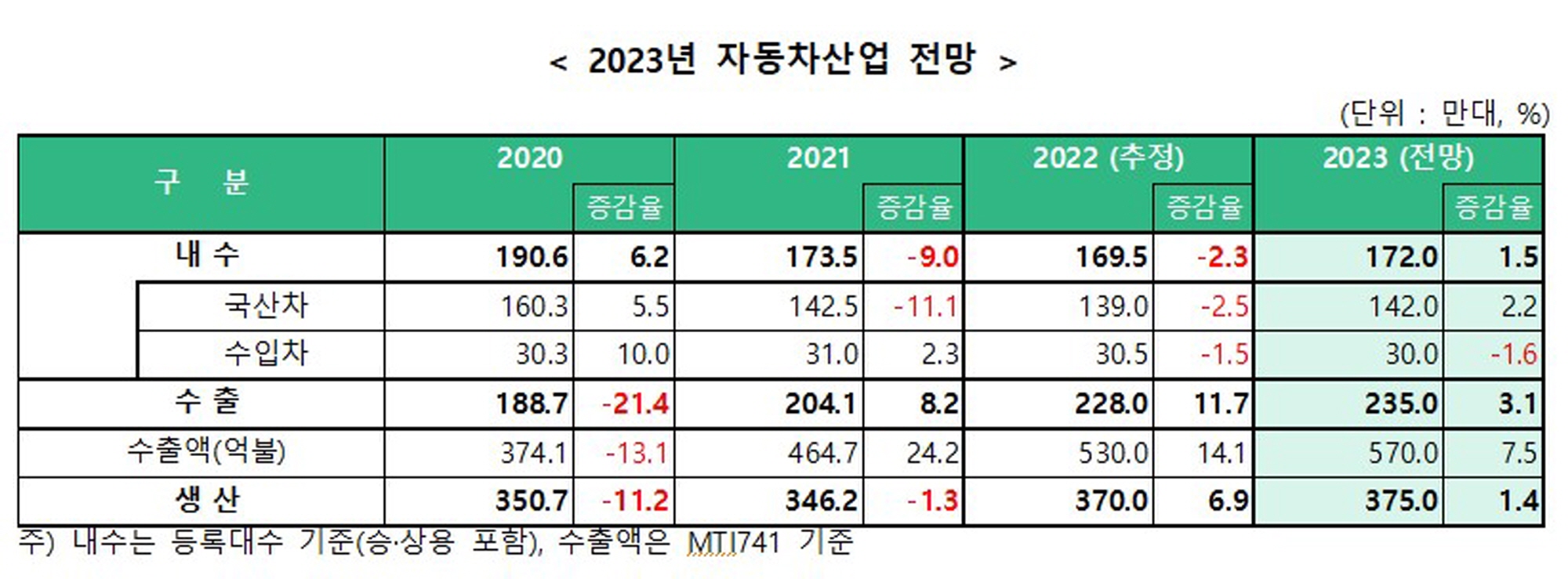
The Korean Automobile Manufacturers Association has released its report on the ‘2022 Evaluation of the Automotive Industry and Outlook for 2023.’
According to the report, the global automotive market in 2022 experienced a 0.7% decline compared to the previous year, dropping to approximately 84.32 million units due to semiconductor shortages and various supply chain disruptions. The United States saw a 10.8% decrease, Western Europe dropped by 9.8%, Japan fell by 7.2%, and Eastern Europe, including Russia, was hit hardest with a staggering 29.1% fall. Meanwhile, Korea fared relatively better with a decline of just 4.2% (based on January to October data).
In global sales, Hyundai Motor Group (Hyundai, Kia, Genesis) maintained its position as the third largest globally with an 8.1% market share, similar to last year (based on January to October data).
The domestic automotive industry in Korea faced frequent production disruptions throughout 2022 due to the ongoing war between Russia and Ukraine, supply chain issues stemming from China’s COVID-19 lockdowns, and semiconductor shortages. However, thanks to improved semiconductor supplies in the latter half of the year, production started to increase, leading to simultaneous recovery in both domestic sales and exports.
Domestic sales, despite the popularity of eco-friendly vehicles and SUVs, recorded a 2.3% decrease from the previous year, with 1.695 million units sold due to reduced supply and high unmet demand.
Exports, buoyed by strong sales of eco-friendly cars, SUVs, and favorable currency exchange rates, rose by 11.7% to 2.28 million units. Additionally, export revenue is projected to increase by 14.1% to reach a record-high of $53 billion, driven by the sale of higher-priced vehicles.
Production faced challenges at the beginning due to the ongoing semiconductor and parts supply issues caused by various global setbacks, but in the latter half, production showed a strong recovery, expected to increase by 6.9% to 3.7 million units. Compared to major automobile manufacturing countries like Europe and Japan, facing energy price surges and component supply challenges due to the Russia-Ukraine war, Korea managed to maintain relatively good production performance.
For 2023, a slight growth is expected as the supply of semiconductors for vehicles recovers, matching the accumulated demand. However, with the tightening of monetary policies post-pandemic, a global economic downturn is anticipated, and high inflation and interest rates may limit new demand.
Domestic sales are expected to grow slightly due to the resolution of accumulated unmet demand and the low performance baseline from the previous year, forecasting a 1.5% increase to 1.72 million units. However, the reduction in disposable income due to the economic downturn and high-interest rates may restrict new demand.
Exports also encounter several challenges, such as the global economic downturn, delays in electric vehicle exports from the U.S. IRA law, and the halt of exports to Russia. Nevertheless, the continued high product quality of domestic vehicles and sustained favorable exchange rates are expected to ensure price competitiveness, with a forecast of a 3.1% increase to 2.35 million units.
Production is projected to rise by 1.4% to 3.75 million units, assuming a smooth supply of various raw materials and semiconductors in response to solid domestic and international demand.
Kim Nam-hoon, chairman of the Korean Automobile Manufacturers Association, stated, “Despite the various global challenges such as the U.S.-China power struggle, the expansion of protectionism, and semiconductor shortages, domestic automakers and parts suppliers have successfully expanded production. Additionally, the government’s efforts to resolve supply chain disruptions helped achieve a record-high export revenue of $53 billion, serving as a pillar for the national economy. To ensure continued export growth, further efforts are needed to minimize the impacts of the U.S. IRA law and resolve export logistics issues in order to secure export competitiveness,” he added.

Lee Sang-jin daedusj@autodiary.kr

